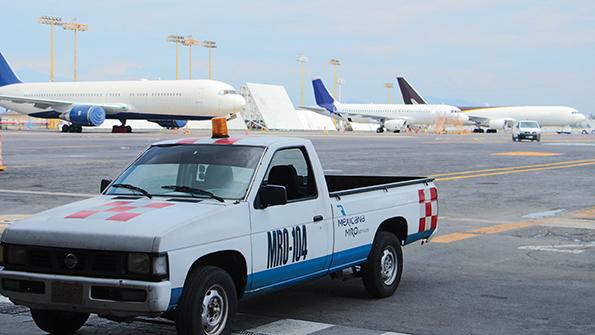
Expect positive things for Mexicana MRO Services in 2022. Two key developments should happen this year to enable the aftermarket provider to finally be able to thrive as an independent MRO.
To help it get there, Emilio Otero joined Mexicana MRO as CEO at the end of 2019, when the company was having financial difficulties. He was brought in to help return the MRO to profitability and prepare it for eventual sale.
The initial plan for recovery was hindered in early 2020, when the COVID-19 pandemic hit and activity slowed.
Mexicana MRO, formerly part of the Mexicana airline group, has had a decade of ups and downs (see box below) and tried to retain most of its employees by reducing everyone’s pay to “the survival salary,” Otero says. As the company gained revenue, it paid people a little more until all salaries returned to their normal rate, and it then paid employees back pay.
Mexicana, like other MROs in Mexico and Central America, benefited from customers who wanted to secure maintenance slots due to labor and supply chain issues in the U.S.
In 2020, Mexicana signed an agreement with Israel Aerospace Industries (IAI) for two Boeing 767 passenger-to-freighter conversion lines until 2024. While the companies completed the first 767-300 in 2017, it was not until the 2020 contract that Mexicana had steady lines for the conversion program. And in late 2020, Mexicana inducted at least two former WestJet 767-300ERs, one of which it converted to a freighter and delivered to Amazon in December 2021.
Of the eight lines at Aeropuerto International Benito Juarez in Mexico City, four are dedicated to widebodies and the other four to narrowbodies. Half of the widebody slots are devoted to cargo conversions. The majority of its narrowbody work is for A320-family aircraft, and the majority of its widebody business is for Boeing aircraft, primarily the 767.
“By the end of 2021, 100% of our lines were full,” says Otero. For the first half of 2022, Mexicana MRO’s eight lines are booked with airframe major checks and conversions, and they are 70% full for the second half.
Mexicana MRO’s revenue target is $55 million this year, “but I think we’ll increase it a little bit,” Otero says. This follows profitable years in 2020 and 2021. “After many years in red numbers, having two years with black numbers is good,” he says. For Mexicana MRO to have consecutive profitable years means it is trending in the right direction, and the fact it returned to profitability during the pandemic is noteworthy.
Next Steps
Putting the MRO on the market this year hinges on rolling out a new maintenance IT system. Since adopting Oracle Complex MRO in 2009 after a two-year implementation process and then losing it in the bankruptcy, the MRO had not had an integrated IT system until it started implementing EmpowerMX in September 2021.
As a test case for the IT system, Mexicana MRO performed a C check on a 767-300 freighter this year, completing it a month ahead of schedule. That is the first line to use EmpowerMX, which is now rolling out to the other seven.
By the end of August, EmpowerMX should be live throughout the company, although Otero says that might happen a little sooner. That timing is important because it is a critical milestone to be completed before the MRO can be put up for sale.
Otero also revealed two growth initiatives that he plans to start this year: growing backshops utilization and line maintenance offerings. Mexicana’s backshops for composites, hydraulics, seats, structures, avionics, nondestructive testing and other items are operational, but seeing very low utilization. To fill those shops again, “we are looking for a strategic partnership” or an “alliance with potential customers” to utilize that capacity, Otero says.
To grow its line maintenance business this year, the MRO would like to expand to Mexico City’s Felipe Angeles International Airport, Cancun, Monterrey and Guadalajara.
Customer Shift
Prior to the pandemic, most of Mexicana MRO’s customers were from Latin America and had signed one-aircraft contracts. Specifically, 90% of the work came from Central and South America, and 2% was from North America.
During the pandemic, Mexicana MRO has secured longer-term heavy check and cargo-conversion customers, and those numbers in 2021 shifted to 20% from North America and 68% from Central and South America. Mexicana MRO is projecting North American customers will constitute 35% of its business in 2022.
Having steady, nose-to-nail aircraft maintenance and cargo-conversion lines has not only made the company profitable and removed a lot of the variability that comes from spot customers, but it also has altered its customer base (see map). “The change from spot customers to nose-to-tail customers has been a very big change,” says Otero.
Sale Details
When Mexicana MRO spun off as an independent entity after bankruptcy proceedings ended in 2014, the company had numerous creditors.
“There are their creditors, like the government, the airport authority and the employees, but Mexican law gives preference in payment to employees,” says Otero. So after Mexicana MRO is sold, employees will be paid first and if there is any money left, the other creditors will receive the rest. However, “with the amount owed to the employees, there won’t be anything left,” he adds. At that point, Mexicana MRO’s employees will shift from being owners to employees who will receive the equivalent of a nice bonus.
Mexicana MRO In Context
Like the fabled phoenix in Greek mythology, Mexicana MRO is regenerating again, and business has been steadily picking up, following more than a decade of triumphs and meltdowns:
2008 Mexicana MRO became an Airbus authorized service center. Today it’s still the only one in Mexico.
2009 Soaring after finishing a two-year implementation of Oracle’s Complex MRO suite, the MRO hoped to grow major service events to 120 from 100 within two years. At least 50% of its clients were third parties, including Air Jamaica, Alaska Airlines and US Airways, with the rest being from Mexicana group airlines.
2010 Mexicana filed for bankruptcy. The process dragged on until 2014, when a Mexican bankruptcy judge closed the case due to a lack of investors needed to recapitalize the airline—but she allowed its MRO unit, which had been operating during the four-year process, to continue, which effectively divided the company’s MRO and airline assets.
2014 Mexicana closed its MRO facility in Guadalajara.
2016 Mexicana MRO said it generated 1.7 million MRO work-hours and $56 million in revenue and hired consultants to implement lean production to gain efficiencies and improve quality.
2017 Israel Aerospace Industries and Mexicana completed their first Boeing 767-300 passenger-to-freighter conversion. Mexicana hoped to do more conversions but that business would not really take off until 2020.
2019 Mexicana MRO had a hard time securing multiyear contracts. In early 2019, then-Mexicana MRO CEO Jesus Navarro Parada told Inside MRO: “The sales volume is shared by at least 20 different customers, each with more or less the same share of sales. Heavy maintenance for narrowbody and widebody aircraft equates to 63%, two-thirds of which comes from narrowbodies and one-third from widebodies. Line maintenance accounts for about 25% and passenger-to-freighter conversions for 10%, with the rest from other maintenance.” The company was not cash-positive that year.
2020 MRO Holdings CEO Greg Colgan told Inside MRO in January that his company had submitted a proposal to acquire Mexicana MRO for an undisclosed sum. However, the companies did not reach an agreement.
2022 As early as the third quarter of this year, Mexicana MRO should be up for sale.




